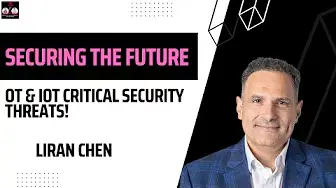In this episode of Securing the Future podcast we interviewed Andrew Peterson who is the co-founder of Signal Sciences a successful cybersecurity start up that was acquired by Fastly for $775M in 2020! Since then Andrew and his partner Nick have invested into 36 different cybersecurity companies and through this experience he has learned the keys to success in not only building a company but specifically a cybersecurity focused company. In this episode, we answer some of the following questions:
🔥 Topics Covered in This Episode:
- How do I know if I have a product that clients will actually use?
- Should I consider paying for a coach to help me as a founder?
- What is the value of coaching?
- What is a day in the life of a founder like?
- What are the biggest struggles you face when founding a company?
- Is there somewhat of a formula for success in building a successful cybersecurity company?
Check out this episode and don't forget to like and subscribe to see more great content!
🔑 Key Takeaways from the Conversation
1. The Emotional Journey of a Founder
- Founders deal with extreme highs and lows — often in the same day.
- A coach (or mentor or therapist) helps normalize those experiences and keep the founder grounded.
- Emotional steadiness is crucial. As a CEO, if you show visible stress or defeat, it can crush team morale.
“If they see me going through and they're like ‘Dude, he looked like he got run over by a train,’ it’s crushing.”
2. The Founder’s Role Evolves
- Early on, you’re in everything — product, Slack threads, decisions.
- As you scale, your involvement can become counterproductive. Just a CEO weighing in on a feature might make the team drop everything to act on it.
- You must learn to pull back and let your team operate independently.
3. Personal Life = Professional Performance
- Life and work aren’t separate — if something’s off personally, it affects professional output.
- Strong communication and openness between investors and founders is essential to catch issues early.
4. Startup Experience Matters
- Coming straight from a large company to founding a startup is often a shock.
- People underestimate the power of brand. Once that’s gone, everything — PR, hiring, sales — gets harder.
- It’s better to get some startup or scrappy operational experience first.
5. Curiosity and Adaptability Are Core Traits
- The best founders are curious and adaptable. They pursue truth over ego.
- Andrew calls this: “Strong opinions, loosely held.” You must be ready to pivot based on real-world feedback and data.
6. Validating Ideas: Money Talks
- People will often give positive feedback to be polite — especially if they know you.
- The most trustworthy validation? Someone paying for your product or service.
- Even a one-off consulting engagement is better than vague “this sounds cool” feedback.
“I don’t trust early feedback. But I trust dollars.”
7. How to Solicit Real Feedback
- Frame your questions to encourage dissent: “What am I missing?” or “Tell me why this might fail.”
- Create safety for people to be honest. Acknowledge your bias and emotional investment upfront.
8. AI & Cybersecurity: Hype vs. Substance
- Customers don’t care whether it’s AI, ML, or cron jobs. They care about outcomes — especially automation of repetitive tasks.
- In security, false positives are a critical issue. Many CISOs still equate AI/ML with “false positive engines.”
- AI should be a piece of the solution, not the whole product — especially in high-risk spaces like cyber.
Got a good story to share?
Be a guest on our podcast.
Is your organization prepared to handle cyber threats? From ransomware readiness assessments to virtual CISO leadership, TechCompass offers comprehensive solutions to secure your digital assets.
.webp)





.avif)


.webp)

